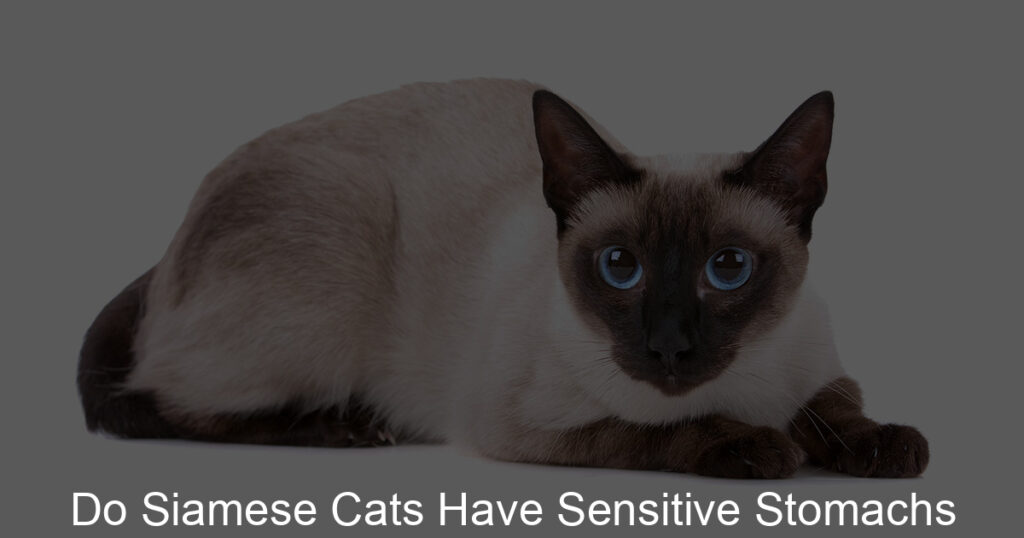Owning a Siamese cat brings both joy and many questions with it. One common thing most Siamese cat owners ask is “Do Siamese cats have sensitive stomachs?” While the breeds of any domestic pet come with their unique traits, there are some important things to know when it comes to feeding your siamese feline.
Are Siamese cats prone to digestive issues?
Siamese cats are known for their outgoing personalities and unique coloring, but did you know that they also might be at risk of digestive issues? While any cat – no matter the breed – can experience digestive woes, Siamese cats may be more predisposed to do so.
In addition to possible digestive concerns, there are several other health issues that the breed is prone to experiencing. It’s always a good idea to keep an eye out for signs of stomach distress or indigestion in whatever type of cat you have and take them to the vet if they exhibit any concerning behaviors or changes in their appetite.
What are some common signs of a sensitive stomach in Siamese cats?
Siamese cats are known for their inquisitive nature and intelligence, but they can also be prone to sensitive stomachs. Some signs of a sensitive stomach in a Siamese cat may include vomiting, loose stool or diarrhea, decreased appetite, weight loss, excess gas, and frequent licking of the lips.
If you start noticing any of these signs in your Siamese cat it may indicate that they have an underlying gastrointestinal issue, so it’s important to take them to the vet.
They’ll likely need specialized food or medication to keep their sensitive stomach under control. Keeping a close eye on your cat’s eating habits is essential for taking care of both their mental and physical health!
Can diet play a role in a Siamese cat’s sensitive stomach?
It seems that, when it comes to the sensitive stomachs of Siamese cats, diet can play a major role in ensuring their well-being. While some cats may suffer from chronic conditions such as irritable bowel syndrome (IBS) or inflammatory bowel disease (IBD) for which dietary changes may only offer fractional relief, a carefully balanced diet and the right type of food are essential to ensure all-around digestive health.
From raw diets to dry kibble, there are plenty of options that cater to your cat’s individual needs that could make all the difference as far as their digestion is concerned. Consulting with your veterinarian will provide tailored advice on helping to support your Siamese cat’s sensitive system with an appropriate and nutritionally balanced meal plan.
When should I take my Siamese cat to the vet for digestive issues?
If your Siamese cat is having digestive issues, it’s important to take them to the vet as soon as possible. Even minor upsets can turn into bigger problems quickly and should not be left untreated.
Be sure to watch out for warning signs that might signal something more serious, such as bad breath, vomiting, diarrhea, a decrease in appetite or activity levels, or changes in litter box behavior.
If any of these conditions last more than two days or become worse over time, then you’ll want to book an appointment with your veterinarian right away. Taking your cat for preventive check-ups every year is also a good idea since most cats hide illnesses until they reach advanced stages.
Are Siamese cats prone to vomiting?
Siamese cats may have a reputation for being some of the most beautiful cats around but as with any animal, they are not impervious to health issues. One concern among owners is that these cats are prone to vomiting. Unfortunately, there is no simple answer as it will depend on the individual cat and their lifestyle.
You should always keep an eye out for any signs of illness or digestive problems but keep in mind that cats naturally vomit up hairballs and other items that they can’t digest, so some level of vomiting should be considered normal behavior. If you’re worried about your Siamese cat, however, you should consult with a veterinarian for advice and support.
What are the health risks of Siamese cats’ stomachs?
Siamese cats may be as adorable and as popular, but it’s important to recognize the potential health risks these cats face in their stomachs. Primarily, Siamese cats are at risk for developing sensitivities to certain food items, resulting in vomiting and intestinal distress.
Additionally, these cats are more likely than other breeds to suffer from inflammatory bowel disease (IBD) which can lead to diarrhea and even weight loss over time. On top of this, they also run a higher risk of developing gastrointestinal issues like constipation due to hairballs.
Taking precautions such as investing in high-quality food and brushing your cat frequently should help reduce the chances of your beloved Siamese suffering from any serious stomach troubles.
Conclusion
Ultimately, the answer to the question, ‘Do Siamese cats have sensitive stomachs?’ depends greatly on each cat. Some cats have hypersensitive digestive systems and may require special diets or medications as a result. On the other hand, some Siamese cats can eat just about anything you offer them without any adverse effects or health problems.








